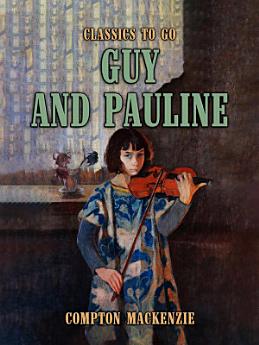Guy and Pauline
Nov 2023 · Otbebookpublishing
Ebook
290
Pages
family_home
Eligible
info
reportRatings and reviews aren’t verified Learn More
About this ebook
Guy and Pauline is a 1915 novel by the British writer Compton Mackenzie. It was begun on Capri and written in three and a half months, and remained Mackenzie's favourite of his own works. It was published in America with the alternative title of Plashers Mead. The story follows the lives of two young people, Guy and Pauline, as they navigate their way through the complexities of love and relationships in early 20th century England. Guy is a handsome and charming young man who comes from a wealthy family, but he is also restless and dissatisfied with his privileged life. He meets Pauline, a beautiful and intelligent young woman who is also searching for meaning and purpose in her life. The two fall in love and embark on a passionate and tumultuous relationship.As their relationship progresses, Guy and Pauline encounter a series of obstacles and challenges, including societal expectations, family pressures, and personal demons. They must navigate their way through these challenges and find a way to make their love work.The novel is a poignant and insightful portrayal of the complexities of love and relationships, and it offers a fascinating glimpse into the social and cultural mores of early 20th century England.
About the author
Compton Mackenzie (1883-1972) was a prolific British author, cultural critic, and co-founder of the Scottish National Party, whose literary career spanned over six decades. Born in West Hartlepool, England, Mackenzie was educated at St. Paul's School and Magdalen College, Oxford, where he developed a keen interest in literature and politics. His diverse body of work includes novels, biographies, memoirs, and satirical pieces, reflecting his versatile talent and keen observational skills.Mackenzie's early novels, such as "Sinister Street" (1913-1914), were celebrated for their vivid portrayal of Edwardian society and the complexities of youth. His wartime service in the Royal Marines and later in British intelligence during World War I provided rich material for his semi-autobiographical works, including "Gallipoli Memories" (1929) and "Greek Memories" (1932). The latter, however, embroiled him in controversy, leading to a trial under the Official Secrets Act due to its candid revelations about British espionage.A passionate advocate for Scottish nationalism, Mackenzie co-founded the Scottish National Party in 1934, championing the cause of Scottish independence. His deep love for the Hebrides, where he resided for many years, is evident in his "Highland" novels, such as "Whisky Galore" (1947), which humorously depict island life and have left an indelible mark on Scottish literature.Mackenzie's influence extended to contemporary writers, with his innovative narrative techniques and exploration of social issues resonating through the works of later authors. His legacy as a literary maverick and cultural commentator continues to intrigue and inspire modern readers, ensuring his place in the annals of British literary history.
Rate this ebook
Tell us what you think.
Reading information
Smartphones and tablets
Install the Google Play Books app for Android and iPad/iPhone. It syncs automatically with your account and allows you to read online or offline wherever you are.
Laptops and computers
You can listen to audiobooks purchased on Google Play using your computer's web browser.
eReaders and other devices
To read on e-ink devices like Kobo eReaders, you'll need to download a file and transfer it to your device. Follow the detailed Help Center instructions to transfer the files to supported eReaders.








